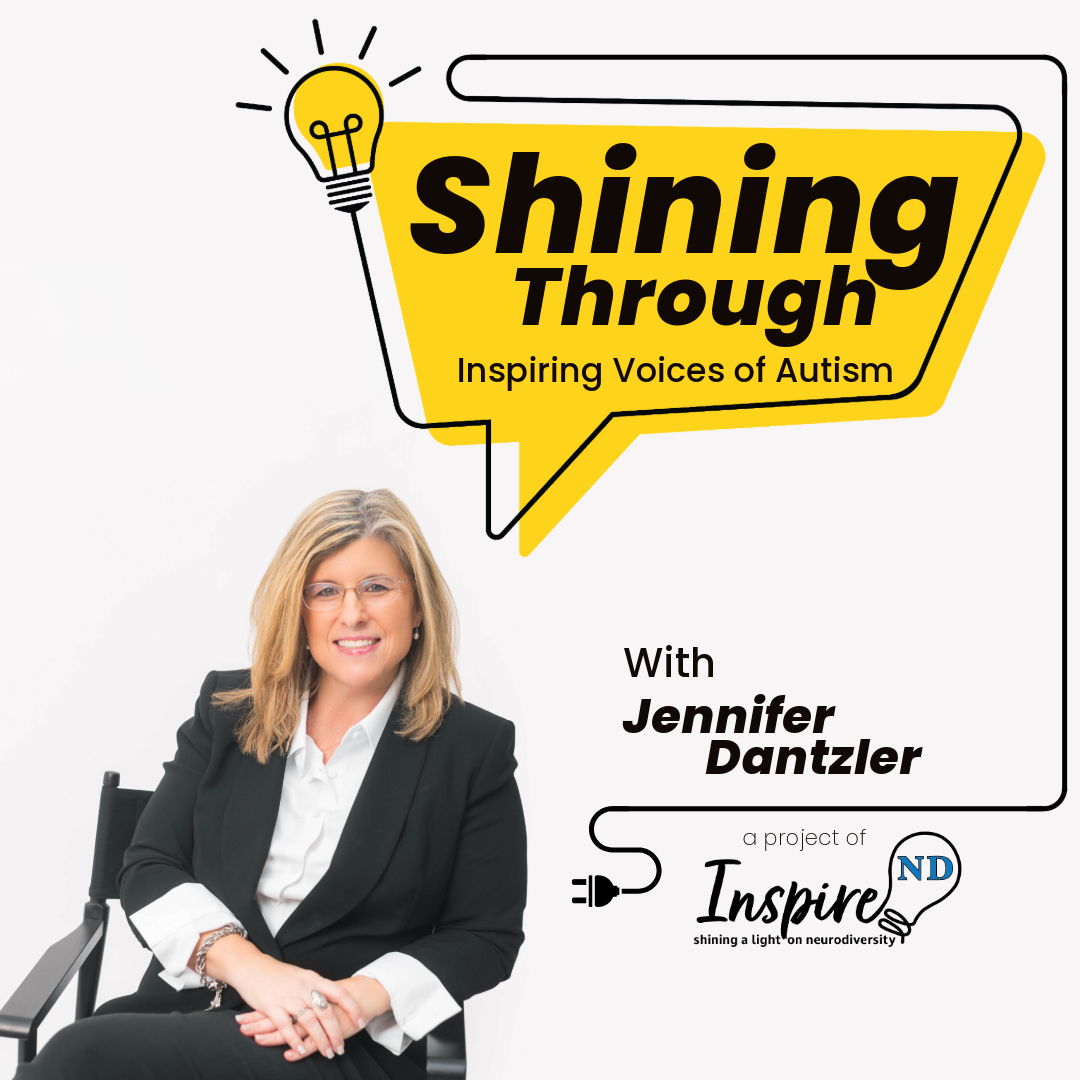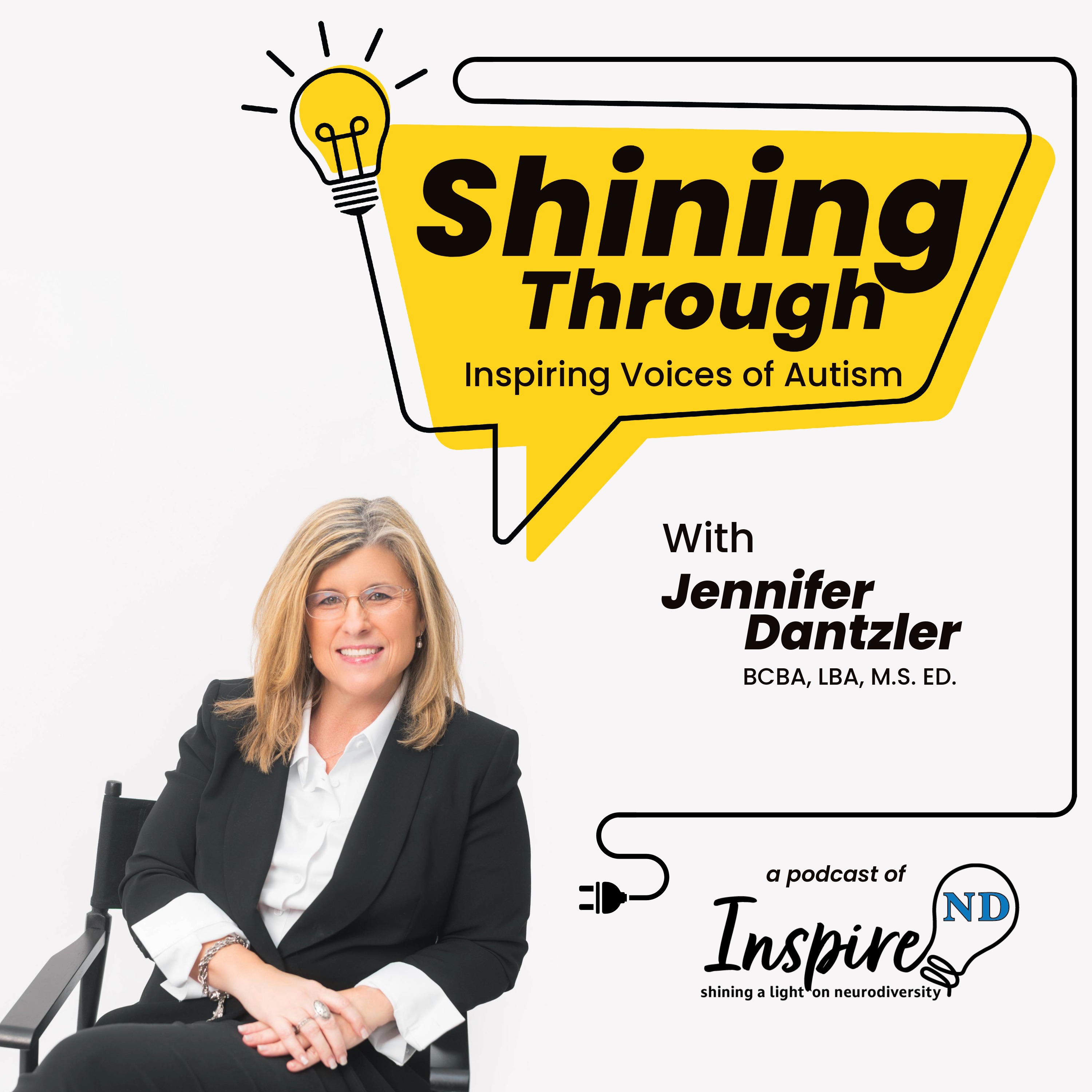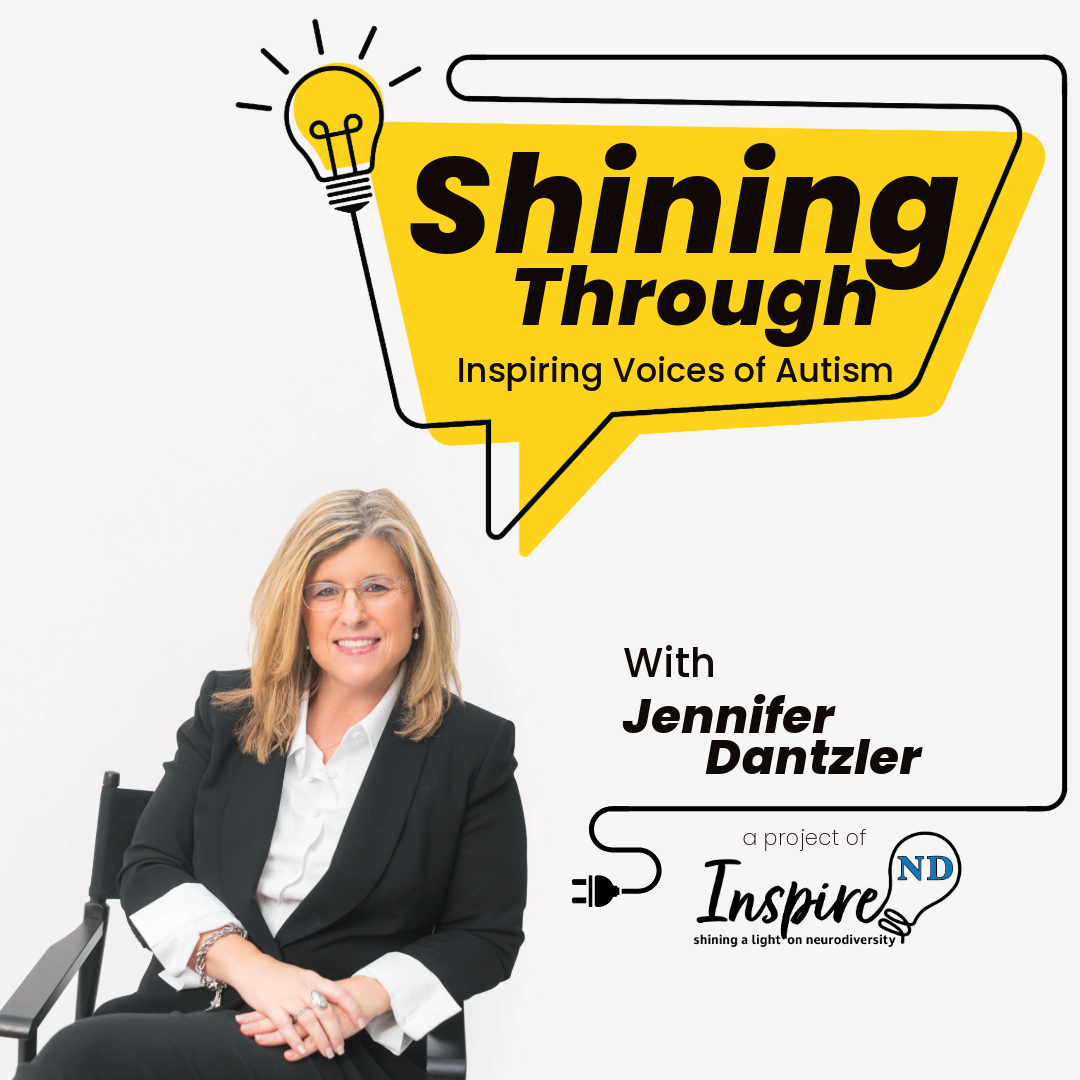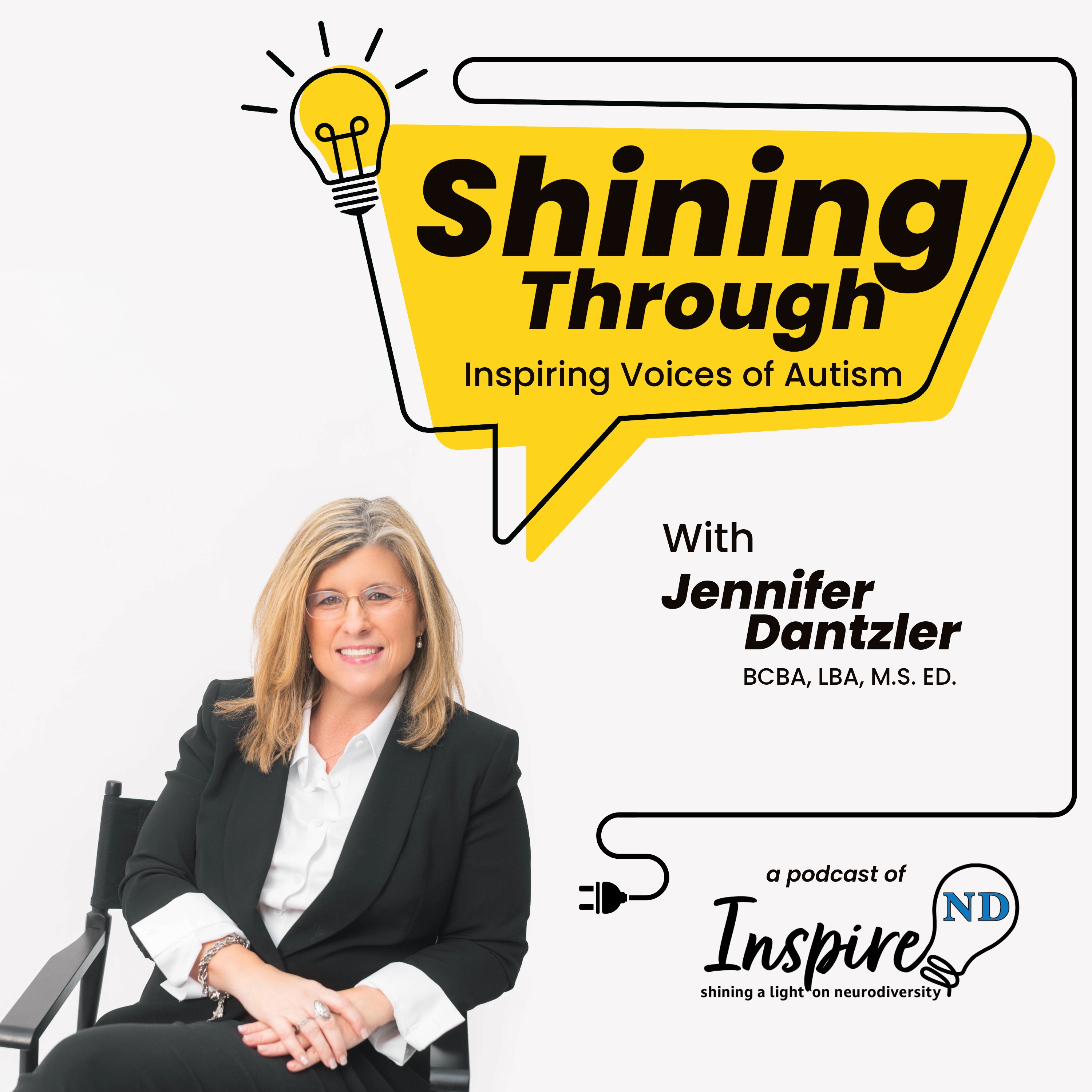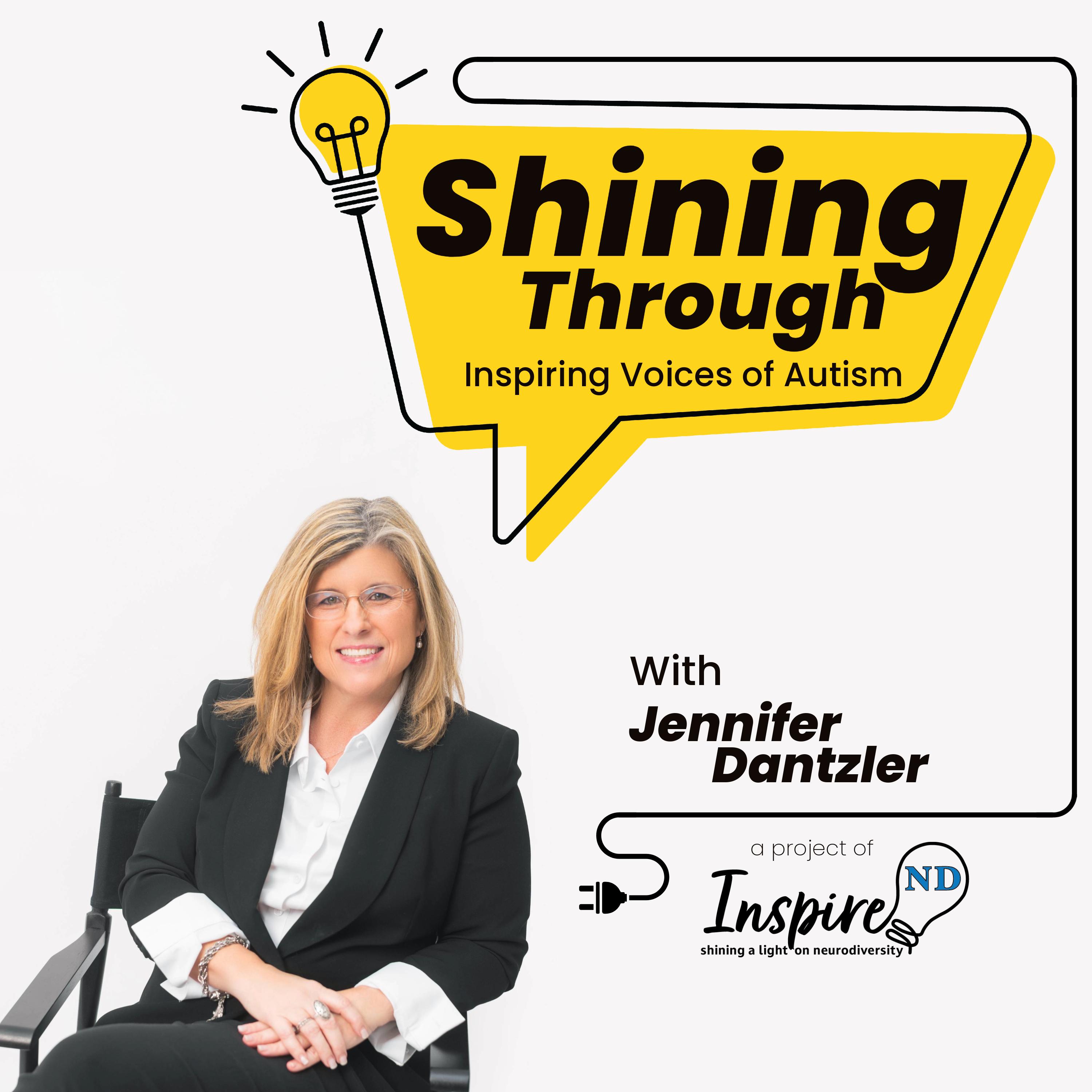[00:00:01] Speaker A: Welcome to Shining Through Inspire Voices of Autism with show host Jennifer Dantzler. My name is Veronica and I have Williams syndrome. Thank you for taking the time to learn more about the world of autism. If you enjoy what you hear today, don't forget to subscribe to this podcast. Hey, everyone, this is Jennifer Dantzler, and I'm the executive director and founder of Inspire nd, a nonprofit whose mission is to create truly inclusive communities through education and engagement. The goal of this podcast is to shine a light on real people and their stories in hopes of inspiring others who are on this journey of autism. Either themselves, their child, their loved one, their co worker. I truly believe ignorance is not bliss, and we cannot be inclusive communities if we do not understand the people in the community.
With autism now affecting 1 in 31 people, we need to get louder about this topic. We recognize that autism is a spectrum. There are a lot of people with a lot of different needs, a lot of resources available or none available. And we know that in every episode we can't meet meet everyone's needs for their specific interest.
However, we hope that in each episode you do gleam some kind of insight as to how you can help your child or yourself be a better advocate. And as we go through our podcasts, our goal really is to address the entire spectrum, the various needs, the various environments that we're going to be in. And we hope that there's something in every episode for each one of you. So let's get started.
Okay, everyone, thank you for being back here with us Today on part two with Dr. Amy Woody. I highly recommend if you had not listened to part one, to stop this episode right now. As you're on your treadmill, go back and listen to part one just so you can get caught up on what we've talked about so far. Dr. Amy Wood has many accolades, primarily in the world of advocating for people with autism. But we hear her talking about today about her son, James, who's on the profound end of the spectrum. So, Amy, thank you for being back today.
[00:01:54] Speaker B: It's my pleasure. Thank you for inviting me.
[00:01:56] Speaker A: Okay, let's talk a little bit about. We talked about how we've gotten to where we are right now with James, who's 22, just finished public school, and is now starting in Project Beacon, an adult server services program. What does your ideal future for James look like?
[00:02:08] Speaker B: Access to expertise and experienced individuals who have behavioral expertise. That's really critical for him to be successful. I envision him having opportunities for vocational pursuits. He will need somebody to accompany him to a job site. But he has so many great skills that could be very beneficial to other nonprofits, to businesses. We're looking for community partners in that regard. And we have some employers that are very open to having individuals like James and other individuals with neurodiversity. They can contribute to the work environment. Employers are really missing, if you will, a group of potential employees, individuals that have neurodiversity. You know, these days, it's a lot of times it's hard to get people to come to work, be really focused on what they're doing. Well, our folks are very good at that. James has a lot of those skills and characteristics. I think a lot of individuals that have always known him as being profound or the individual who diagnosed him, they would have never guessed that he would be able to access the community vocationally from a leisure perspective, from a social perspective. If he has the right supports around him, he can definitely do those things and he enjoys them. He finds a lot of joy. And you can see that in being purposeful every day.
[00:03:35] Speaker A: And I'm going to take a second just to give a little shout out to. One of the services that we do offer at Inspire ND is neurodiversity in the workplace. So if you are an organization that already support people with neurodiversity, we'd be happy to come in. Or if you want to support people with neurodiversity meaningfully employing them. I can rattle off a whole bunch of statistics right now about the more effectiveness of the team, how the community supports businesses who support people with neurodiversity, and the benefits go on and on. So if you are an employer and would like to just learn more about what it takes, please reach out to inspirend.org what can our listeners do today that can help make us more inclusive and more welcoming for those with profound autism?
[00:04:17] Speaker B: I think that there is still definitely a big educational component about profound autism and what that entails and what the support needs and the profile of an individual with profound autism is because I think that that is a group of individuals that really have been misunderstood quite a bit within the greater community and quite frankly, within even the autism community. That educational piece is an important one. Your willingness, if you're a business or you provide services in the community, we want to be able to have those individuals amongst you. Sometimes you may see individuals with neurodiversity, they may look different, they may act different, but 1 in 31 children has autism and they're going to be an adult one day. I think that Openness to being accepting of those individuals and some of their differences. I think that movement towards acceptance of individuality, whether it be neurodiversity or otherwise, is very much in our favor. I think society is recognizing that there are individuals with differences and learning differences among us. If we all are open to some of the possibilities of how to support that person or make them successful, I think that we will continue to see those individuals be more present in the community itself.
[00:05:42] Speaker A: You know, I always say ignorance is not bliss. We'll never forget a story where one day I was on one of our local social media channels someone put on there, I can't believe what our society has gotten to now. We're letting teenagers be pushed around in a grocery cart watching their iPad and parents aren't even making them walk through the grocery store that way, enabling our teenagers of today. And my first thought was, no, I can almost guarantee you that was a parent, a child who's maybe profoundly affected and this is their only way to get to the grocery store is by having them be in a grocery cart watching an iPad. Because if not, the alternative might not be so good. Whether it's running and lack of safety or whether it's taking boxes off of shelves and eating the cereal, whatever it is. Luckily there were only a few people who got on to reinforce that. And then more people got on to say, have you thought about maybe there's an extenuating circumstance that we don't know about that I didn't have to fight that fight. The rest of the community fought that fight for me. As to your point, awareness is just, I think, so crucial because we need to give more grace. I would say we all probably argue as a society in general, but we definitely need to give a little bit more grace, especially to our more profoundly affected.
[00:06:50] Speaker B: For sure, Jennifer. And I think it's one thing to see a child who has unique or special needs, and it's another thing to see an adult individual accessing grocery stores or normal community environments. It looks different. And the willingness to be successful as James has grown where we live, it's been, for the most part, it's been amazing how supportive people around us have been. Even when he's having a very tough moment, there's normally somebody that works there that comes up and whispers in my ear, how can I help you? I appreciate that so much. I often see those things as also an educational scenario. You can't get better in the community if you don't go out there and practice. Actually have to do that. And that's the. I think the beauty of behavior analysis is it's not just sitting one to one at a table with an individual. It is applying those principles to help them be successful in an environment. And if they do have problem behavior, let's see if we can address that. Because not only do you want them out the general community, but you want them at special needs events as well. Things that are designed specifically for individuals with neurodiversity. Sometimes our more profound individuals are excluded from that. And so I think that even in and of itself would open up more doors and more potential for quality of life opportunities.
[00:08:18] Speaker A: We'll see things like sensory friendly events, but to your point, I don't. There might be a little bit of bandwagon stuff going on with that where that's just to get more customers, but they really haven't made it sensory friendly or to your point, made it truly friendly for the entire spectrum of needs. And so I think again, the more ignorance is not bliss, the more we can get out there and educate. I don't believe that most of the businesses out there, most of the community organizations out there want to do wrong by the profound autism community.
They just don't know what to do to help. To your point, they might come up and whisper in your ear, how can I help? I think there's still people in the grocery store that don't know whether they should come up and offer to help or whether you just want them to leave you alone and just work through the issue.
[00:09:00] Speaker B: Absolutely.
[00:09:01] Speaker A: Yeah.
[00:09:01] Speaker B: There's a comfort level on both sides there.
[00:09:04] Speaker A: Yeah.
[00:09:04] Speaker B: And education does help with that for sure.
[00:09:07] Speaker A: So let's segue then into the work with feet. Feet has been around for several decades now, and actually feet used to be felt families for early autism treatment.
[00:09:17] Speaker B: Yes, it was early, originally.
[00:09:19] Speaker A: Yes, yes. And then you changed it to the word effective. So talk a little bit about feet, what feet does feet's journey over the last few decades.
[00:09:27] Speaker B: So Feet was originally started by about five or six families 30 plus years ago who were fighting to get early intervention for their children. And at the time, there weren't really any resources to do that in the Houston area. They had to fly individuals out from ucla, which was a big thought center back then in terms of, you know what? We don't have to just relegate these individuals to institutions. We can actually apply some of this and they get better and they acquire meaningful things, meaningful skills. It was originally geared towards that early scenario, the chapter in Houston. We wanted it to be on scientifically validated therapy for individuals with autism. If you know anything about the autism world, you know that there's a million things that are promoted as being beneficial or helpful for individuals with autism. Our focus really has been on what we consider to be validated in the literature. And right now, ABA continues to be that gold standard, the treatment of choice for individuals with autism. We worked really hard in those early years to attract expertise in behavior analysis to the Houston area. And getting Jennifer Dantzler was a. We consider that to be a huge, huge win for the Houston area for sure, and for feet. And so we want to be and have been a portal of information for families. How do you access aba? How do you assess an ABA program, or what should you be looking for? Early on, we had to teach people how to go to their insurance company and their employer and say, you know, you should be covering this. And there were a lot of parents that fought that fight early on, and we're still fighting that fight. You know, we've now finally got Medicaid to cover behavior analysis for early intervention for individuals, but we're still fighting with the state to reimburse it to a level where providers can actually provide it successfully and be able to stay in business. So, you know, that's an ongoing process, and we are always part of the advocating process for that. FEET is typically very present and upfront and collaborative with professionals in the field to meet those objectives and provide as much opportunity for early intervention, no matter who you are and what your socioeconomic status status may be.
We also have always considered the public schools and teachers to be some of our stakeholders. Educating teachers, educating districts, that allows our reach to maximize the number of kids that we can benefit. So over the years, we've provided many trainings, many scholarships to teachers to go to, trainings to learn about behavior analysis and how that can be successfully applied in a classroom or public school environment. We've supported many programs like that over the years, and we have also reimbursed tuition for public school teachers who wish to go on and get their certification, behavior analysis, get their master's degree. As the population continues to move, that first generation of us that got early intervention or second generation or so, now we're focusing very much on adult services and how do we bring best practice behavior analysis, that gold standard, into the adult realm because it has to have a presence there. And so that is also a big focus. There are individuals that are still slipping through the cracks that have no ability to access behavior analysis. So we do provide focused grant funding for families if they have A very targeted challenge, whether it be something like toilet training or they're having very significant problem behavior in the home. We will provide grants to those families if they do not have insurance or another mechanism to be able to get some time with the behavior analyst to, you know, oftentimes some of these individual families are kind of in a moment of crisis. And so we're trying to connect them to professionals in the field to be supportive of their individual and the family itself.
[00:13:50] Speaker A: Wonderful. Yes. FEET is an incredible organization here in Houston and I know they have several around the country, but I'm not biased, but I am biased to say that I think FEET Houston is probably literally one of the best, most active, biggest advocates and proponent of aba. And so we as a community are very grateful for Feet. Where can people learn more about Feet?
[00:14:10] Speaker B: So you can go to Feet Houston and it's f e a t houston.org Our website is very rich with information and resources throughout the Houston area. Most or many of the providers listed there, where you can go to one place and see all the ABA providers in the area, which is very helpful because we're a 600 square mile city and finding resources in your particular area is still not always easy to do. We also have tons of information about ABA itself. What you as a consumer, what you as a parent, what you should be looking for in an ABA program. What are good questions to ask providers when you're selecting one for your child. That's critical information. And we also do support bringing thought leaders into the Houston area. We collaborate with professionals on that and we try gear a lot of those trainings towards parents. I cannot encourage parents enough to go to trainings on specific things that you may be targeting with your child or trying to focus on. There was a time where FEET Houston was the only one doing trainings in that realm, but now we have a lot more in the area Feed. Houston's website and newsletter lets you know about all of them across the area.
And it's such a good opportunity for parents to go and get that knowledge. It helps you be a better parent and collaborator with your child's provider.
[00:15:48] Speaker A: Wonderful. Wonderful. Yes. Incredibly invaluable source. And FEET is run by all volunteers.
All moms, I believe, are walking the journey in some form. And so their insight is true, it's real, it's invaluable. And so we're very appreciative of all the people on the FEET board who give their time to our parents who are struggling. So I really appreciate that. What is something you want to Tell the parents of a newly diagnosed child.
[00:16:15] Speaker B: I think, number one, you're going to have to be involved in your child's treatment, whether it is in the ABA realm, the speech realm, the occupational therapy realm. You're not going to be able to go to speech twice a week and see the benefits unless you. You are part of the process and helping your child acquire skills. It's crucial for individuals with autism getting applied behavior analysis. I always say it's equally a parent and a child program. It needs to be both. You do need to be part of the solution and learn how to support your child, learn how to help them learn. It also gives you a tremendous bond with that child as a parent. The types of signals that individuals with autism often send off, or the way that they're affectionate or not affectionate, and the things we long for as a parent.
A lot of times those are hard to come by with individuals on the spectrum. And I have found that not only am I empowered by learning how to apply behavior analysis in our natural daily life, it has bonded me to my child in a way that is beyond meaningful, and it has blessed us.
[00:17:33] Speaker A: That's so important. And I know on another episode with Emily Harris, she is on the higher end of the spectrum. And her dad talks about when she would just run in circles around the coffee table, and he struggled so much with it, and then he said something, and she said, just ask me. Like, he said, I don't know what to do. And so I talked to him about it, and then he just went and asked her, why do you do this? And she had a brilliant response to that. Now, our guys on the more profound end might not be able to verbally say it. So to your point, you really have to get to know them intimately to be able to ask that question. Just asking that question might look a different way, but really trying to understand what makes them tick, why they do what they do, what they need to be successful in life.
[00:18:20] Speaker B: Absolutely. I would also recommend that parents start early and continue getting them out in the community.
Sometimes that's not an easy thing to do. But it is so important for when they are an adult that they have had exposure to community events, community environments. Sometimes it's hard to find the drive to say, okay, let's try this restaurant again.
The time you invest in that and the time you invest working with a behavior analyst or your ABA provider to acquire the skills to be successful is so valuable to your child and to the family. So, you know, you gotta get out in the community. You gotta Try. You gotta work with professionals to help you be successful. It's just very important.
[00:19:09] Speaker A: So now that James is 22, this might be a hard question to narrow down, but what do you think is probably the most important skill you taught James?
[00:19:18] Speaker B: How to follow a list of a task analysis. To learn something, to do something. And it can be something as simple as unloading the dishwasher. It sets him up for almost every skill that he has independently in the home environment. I mean, like, we literally taught him to take a shower independently. That way, once he learned to acquire those skills and learn how to follow a list of things to accomplish something that is broken down small enough for him to master each skill, it opens the world up to him. It's a gateway skill. And, you know, we all have that. We all have an activity book. We all have a to do list. You know, he can do his by looking at his phone now. And we live by those things, quite frankly, our schedules and our calendar and that type of thing.
And for him to have that skill and be able to apply it across environments, whether it's working on the coffee cart in the high school environment, he was able to vocationally do that. And he loved that. Without that grouping of skills, he would be so much more limited. I would also say, I would just emphasize, too, toilet training is so critical and it takes a long time. Sometimes it was a slow process for us to get him trained, but now that he's in the adult world, and I see what that looks like, it is so crucial to get as much independence with that as possible. Truly, your individual is not necessarily going to end up in a very good place if that is not something that they've been able to accomplish.
[00:20:55] Speaker A: Yes, and I talk about that a lot with families, right, because they'll say, oh, they're independent with toileting, but all I have to do is just stand there and monitor.
Well, then that means later, some other adult who might or might not be trustworthy is the one having to stand in that doorway or stand in that bathroom with your young adult. So when we talk about toilet training, as Amy said, it's as independent as possible, which means, ideally, not having to have someone else in the bathroom. So whether it's using other apparatus or tools or supports, whether it's using wipes, whether it's using the washer to help clean your bottom after a bowel movement, whether it's putting something in the shower so that the water can't get so hot, whatever the apparatus is, whatever the modification is, do it so that no one else has to be in the bathroom with your child because we do know that our especially are more profoundly affected, are going to be more vulnerable because they can't always tell you if someone's mistreating them.
[00:21:52] Speaker B: I think that's so true and you wouldn't think it would be the case, but teaching James to wear a robe when he walks in and out of the bathroom, that's more than a functional skill, that's a safety skill because this is a group of people that are terribly vulnerable. And as parents, you know, that's our, our child being abused or mistreated along with what's going to happen to my child when I'm no longer on this earth. Those are the two things you worry about the most. It's the nightmare situation. It truly is.
[00:22:23] Speaker A: And I think, as you said, you said it a couple times over these two episodes about your autistic child will become an autistic adult. I think the last piece of advice we probably want to talk about or end on is futures planning and the fact that if we ignore it, it's still going to happen. It just won't happen as successfully. And I think, Amy, you've done an incredible job always keeping your eye on the future and literally building services so that your child and many others can access the community and access appropriate services. And to your point, a good quality of life and be happy. When I see James, James is happy. And I think that's what we all want for our children, is to be happy.
[00:23:01] Speaker B: We absolutely do. It is not too early to start thinking about adulthood. Even as early as 9, 10 years old, once you hit that double digit age and you're 10, there needs to be an eye on that by the parents and by the individuals that are teaching that individual or providing services for them. I always said at school if we're going to put an IEP objective, I have to be able to draw a dotted line at least between what we're teaching and that being meaningful for him when he becomes adult.
So I think it's kind of scary for parents to think about the fact that their 9 or 10 year old is going to be, you know, a 250, 50 pound, 6, 4 individual. But it's going to happen and you're either going to do it successfully or unsuccessfully. And the families that I see not only have a good quality of life for their individual, but for the rest of the family members are very savvy about looking at that early.
[00:24:05] Speaker A: Yes, I love that imagery of the dotted line to begin with. The end in mind kind of thing. And I think we don't do that enough as professionals. And I think that's just a great image to end on. Like always have that dotted line to where you want them to be and where they want to be right as adults. And I know in James's particular, like he loves going to the community, he loves his outings. He wants that. This is not something you're not doing inclusion for the sake of inclusion, you're doing it because it's what he wants. And that's that dotted line that you just talked about. So, Amy, we can't thank you enough for being here. So much wealth of information. As I'm sure all you listeners can tell, she's a parent, she's an advocate, and everything in between. So thank you so much from the bottom of my heart.
[00:24:49] Speaker B: Thank you, Jennifer. I appreciate being part of this process. There's so much information out there about autism for parents. Many times they don't find the meaningful ones. So thank you very much for having this platform to be able to get that information that, that it's truly crucial to parents and individuals with autism.
[00:25:07] Speaker A: Thank you. If you need help or resources, whether you're a parent, someone on the spectrum, a business or a community organization who want to know more or need help or want to share resources, please reach out to
[email protected] Inspire ND invites you to Taste of the Town Lake Houston Thursday, September 11th from 5 to 8pm at the Humble Civic Center. Taste of the Town is the largest food and beverage festival in the Lake Houston area. Showcasing menu items from area restaurants, bakeries, caterers and breweries. It is guaranteed to be the Food Adventures paradise and one of the biggest social events of the year. It all benefits Inspire ND's mission to create truly inclusive communities through education and engagement. Tickets are available now by visiting tot2025eventbrite.com that's tot2025eventbrite.Com or inspirend.org thanks for joining us on Shining Through Voices of Autism. If you enjoyed this episode, be sure to subscribe, leave a review and share with others who want to celebrate neurodiversity. Until next time, keep shining. Sam.
